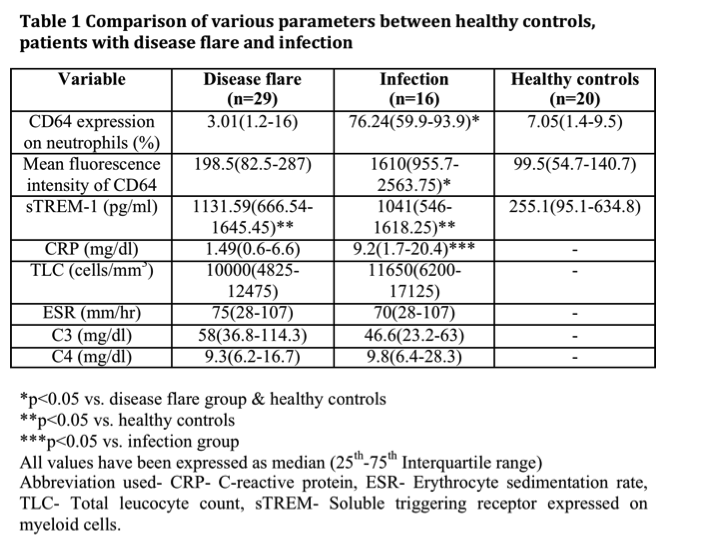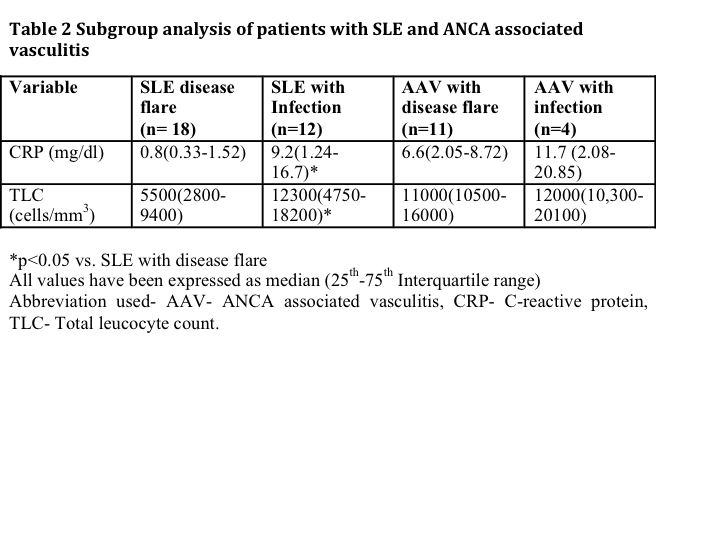Session Information
Session Type: ACR Concurrent Abstract Session
Session Time: 4:30PM-6:00PM
Background/Purpose: Fever is a common presenting manifestation of systemic lupus erythematosus (SLE) and ANCA associated vasculitis (AAV). Treating physician is challenged to differentiate between disease activity vs. infection as to the cause of fever. Presently, there is no clinical or serological biomarker that may reliably differentiate between these two. We aimed to determine the usefulness of CD64 (FcγR1) glycoprotein expression on the surface of neutrophils and sTREM-1 (soluble triggering receptor expressed on myeloid cells) levels in serum in distinguishing bacterial infection from disease flare in SLE and AAV patients
Methods: In this descriptive, cross sectional, observational study 20 healthy control and adult patients of SLE and AAV admitted to our unit either with disease flare or bacterial infection were recruited over a period of 1 year. Neutrophil CD64 expression was measured by flowcytometry and sTREM by ELISA from blood samples collected on the day of admission. Other parameters such as Total Leukocyte Count (TLC), erythrocyte sedimentation rate (ESR), C-Reactive Protein (CRP), C3, and C4 were noted.
Results: Among the 45 patients included in the study 29 (SLE-18 and AAV-11) had disease flare while 16 (SLE-12 and AAV-4) had infection. 62% had fever at presentation. Percentage of neutrophil with CD64 expression and their mean fluorescence intensity in patients with infection were significantly (p<0.05) higher as compared to those without infection and healthy controls (Table-1). CD64 expression as a marker for differentiation between disease flare and infection had a sensitivity of 94% and specificity of 88% at cut off of 30% (percentage of neutrophil expressing CD64). In contrast to CD64 expression on neutrophils, serum sTREM-1 level was not significantly different in patients with disease flare when compared to patients with infection. Though, CRP was significantly higher in patients with infection compared to those with disease flare (p<0.05), however, sensitivity and specificity of CRP to differentiate disease flare with infection was 53% and 79% respectively. TLC, ESR, C3, C4 levels were not significantly different between disease flare and infection group. On subgroup (Table-2) analysis patients of SLE with infection had a higher CRP and TLC compared those with disease flare (p<0.5). Sensitivity and specificity of TLC to differentiate SLE disease flare with infection was 54% and 77% respectively.
Conclusion: CD64 expression on neutrophils is helpful in differentiating bacterial infection from disease flare in patients with SLE and AAV. 
To cite this abstract in AMA style:
Ajmani S, Singh H, Chaturvedi S, Rai MK, Agrawal V. Utility of Neutrophil CD64 Expression & sTREM-1 in Distinguishing Bacterial Infection from Disease Flare in SLE and ANCA Associated Vasculitis [abstract]. Arthritis Rheumatol. 2016; 68 (suppl 10). https://acrabstracts.org/abstract/utility-of-neutrophil-cd64-expression-strem-1-in-distinguishing-bacterial-infection-from-disease-flare-in-sle-and-anca-associated-vasculitis/. Accessed .« Back to 2016 ACR/ARHP Annual Meeting
ACR Meeting Abstracts - https://acrabstracts.org/abstract/utility-of-neutrophil-cd64-expression-strem-1-in-distinguishing-bacterial-infection-from-disease-flare-in-sle-and-anca-associated-vasculitis/

